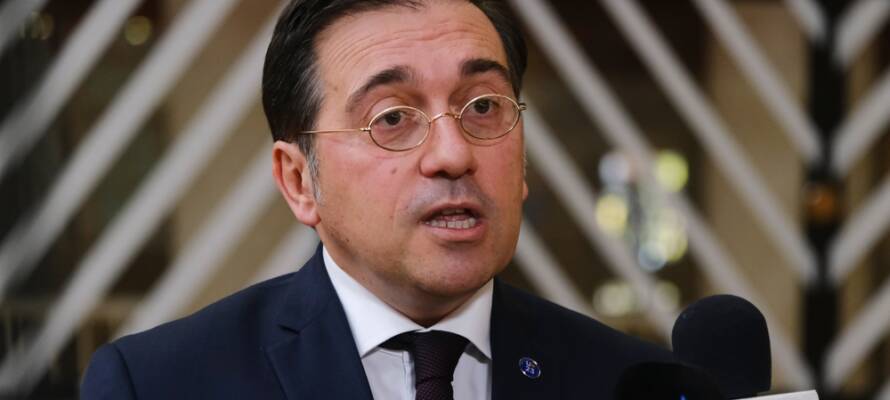Spanish Foreign Minister Albares emphasizes enforcing the ruling if Israel doesn’t comply, as EU leaders discuss the implications.
By Algemeiner
Spain will urge the other 26 member states of the European Union (EU) to officially support a recent ruling of the top United Nations court against Israel and take steps to ensure the Jewish state abides by the court’s decision.
“I am going to ask the other 26 partners to declare the backing of the International Court of Justice [ICJ] and its decision, and also, if Israel continues to pursue against that opinion of the court, we would try to take the right measures to enforce that decision,” Spanish Foreign Minister Jose Manuel Albares told reporters in Brussels during a joint news conference with his Irish and Norwegian counterparts.
The ICJ or World Court on Friday ordered Israel to halt its military operations against Hamas in the southern Gaza city of Rafah, the Palestinian terrorist group’s last major stronghold in the coastal enclave.
Albares’s announcement came on the same day that EU foreign policy chief Josep Borrell told reporters before a monthly meeting of EU foreign ministers that the bloc aims to agree in principle to press ahead with a joint border mission at Rafah, which borders Egypt. The exact role of the European Union Border Assistance Mission, should it be revived, in Rafah remains unclear.
Spain has been one of the most vocal critics of Israel since Oct. 7, when Hamas terrorists invaded the Jewish state from neighboring Gaza. The terrorists murdered 1,200 people and abducted over 250 others as hostages in their rampage, the deadliest single-day massacre of Jews since the Holocaust.
Israel responded with an ongoing military campaign aimed at freeing the hostages and destroying Hamas, which rules Gaza.
In the aftermath of the Oct. 7 atrocities, Spain launched a diplomatic campaign to curb Israel’s military response. At the same time, several Spanish ministers in the country’s left-wing coalition government issued pro-Hamas statements and called for an immediate ceasefire in Gaza, with one member of the cabinet from the far-left Podemos alliance falsely accusing Israel of “genocide.”
More recently, Spanish officials have said they will not allow ships carrying arms for Israel to stop at its ports
Last week, Spain announced coordinated plans along with Norway and Ireland to officially recognize a Palestinian state on Tuesday, May 28. Leaders of all three countries argued such a move would help foster a two-state solution to the Israeli-Palestinian conflict and lead to lasting peace in the region, explaining that the ongoing Israel-Hamas war in Gaza accelerated their plans.
“We hope that our recognition and our reasons contribute to other Western countries following this path, because the more we are, the more strength we will have to impose a ceasefire, to achieve the release of the hostages held by Hamas, to relaunch the political process that can lead to a peace agreement,” Spanish Prime Minister Pedro Sanchez said in a speech to his country’s lower house.
He called the decision one “for peace, for justice, and for coherence,” claiming Spain will be “accompanied by other European countries.”
Israel reprimanded the ambassadors of Spain, Norway, and Ireland over their governments’ plan to recognize a Palestinian state — a decision that Israeli officials described as a “reward for terrorism.”
Spain, like many other countries around the world, experienced a surge in antisemitic incidents targeting the Jewish community following Hamas’ Oct. 7 massacre.
The ICJ emergency ruling was part of South Africa’s ongoing case at the World Court accusing Israel of committing “state-led genocide” in its defensive war against Hamas in Gaza. South Africa’s lawyers asked the ICJ earlier this month to impose emergency measures, arguing Israel’s operations in Rafah must be stopped to ensure the survival of the Palestinians.
Several governments have sought to pressure Israel to forgo a significant military operation in Rafah, citing the potential for civilian casualties; Jerusalem has countered that a ground offensive is necessary to eliminate Hamas’ remaining battalions in the southern Gaza city and destroy its terrorist infrastructure.
Experts have told The Algemeiner that Israel must operate in Rafah, which Israeli officials have described as Hamas’ last bastion in Gaza, if the Jewish state wishes to achieve its war objective of eliminating the threat posed by the Palestinian terrorist group.
The ICJ has no enforcement powers, and Israeli officials have said the ruling allows room for some military action in Rafah, asserting they will do whatever it takes to defeat Hamas regardless of international pressure.
ANTISEMITISM IS SURGING, THREATENING JEWISH LIVES!
Join Six Million United Against Antisemitism!
We stand united against antisemitism and pledge to fight hatred and violence against the Jewish people and its institutions around the world.
Sign the petition - Declare 'Never Again is Now'!























